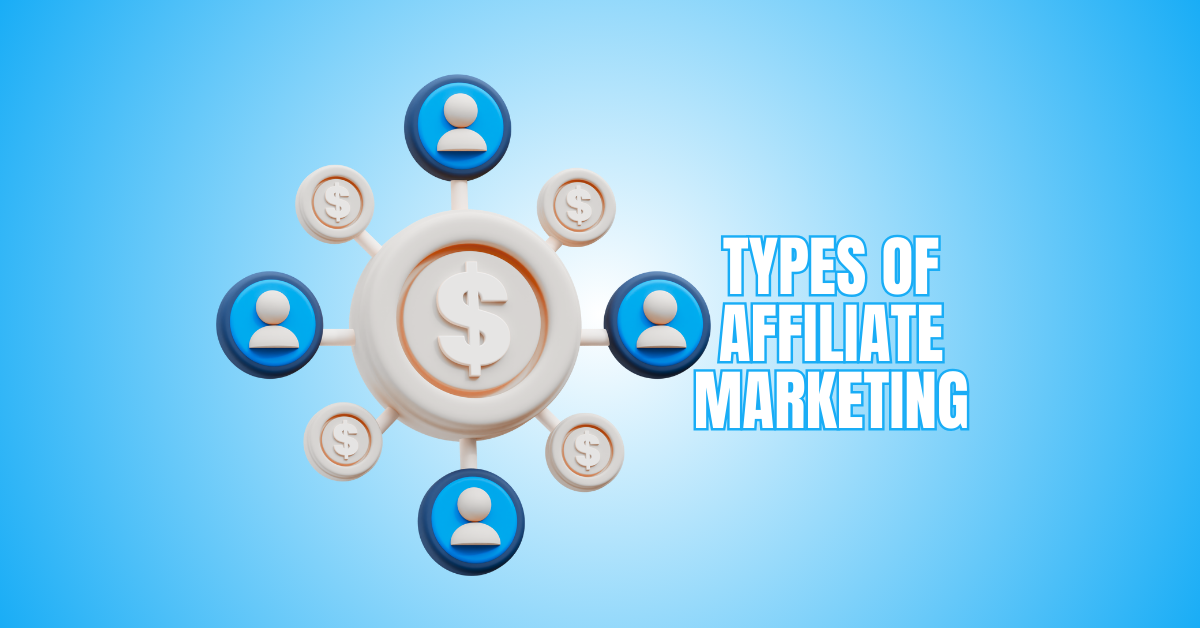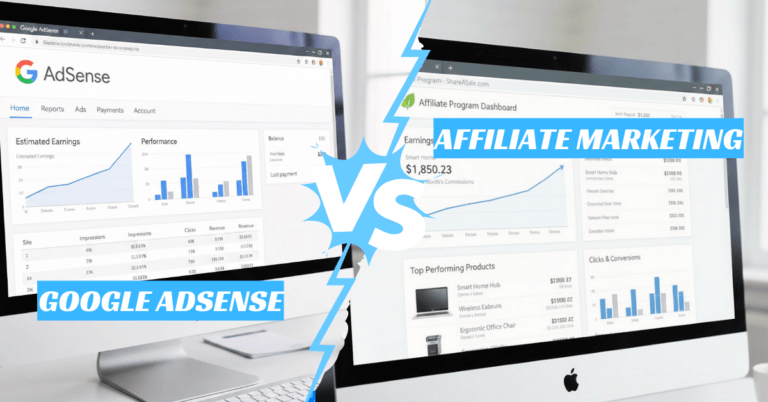Different Types Of Affiliate Marketing
Many people and companies are finding success in making money online through affiliate marketing. Affiliate marketers can use their online presence and audience to monetize their platforms by marketing goods or services and making a commission for each sale or referral.
Participating in many affiliate marketing programs with different strategies and advantages is possible. To provide insights and tactics for prospective affiliate marketers, this article will examine various forms of affiliate marketing and how they operate.
Whether you're a blogger, social media influencer, or website owner, understanding the different types of affiliate marketing can help you choose the most suitable program and maximize your earning potential.
What Is Affiliate Marketing, And How Does It Work?
Affiliate marketing is a performance-based business model that allows individuals to earn commissions by promoting products or services. Understanding how it works is essential for anyone looking to build income through affiliate partnerships.
1. What Is Affiliate Marketing?
Affiliate marketing is a business model in which individuals, known as affiliates, earn a commission by promoting the products or services of other companies.
2. How Affiliate Marketing Works
It works by forming a partnership between the affiliate and the merchant, where the affiliate promotes the merchant's products through various marketing channels, such as websites, blogs, social media, or email marketing.
3. Key Elements Of Affiliate Marketing
Affiliate marketing involves several key elements. First, the affiliate joins an affiliate program or network, where they gain access to a unique affiliate link or code that tracks their referrals. The affiliate then incorporates this link into its promotional content.
4. Affiliate Commissions And Tracking
When a potential customer clicks on the affiliate's link and makes a purchase or completes a desired action, such as filling out a form or signing up for a service, the affiliate earns a commission.
This commission is usually a percentage of the sale value or a fixed amount agreed upon by the affiliate and the merchant.
5. Benefits For Merchants, Affiliates, And Customers
Affiliate marketing benefits all parties involved. The merchant gains exposure and expands its reach through the affiliate's promotional efforts, while the affiliate earns income by driving sales or conversions.
Customers also benefit by receiving valuable recommendations or discounts from mates they trust. Affiliate programs use tracking cookies or other tracking mechanisms to ensure transparency and accurate tracking to attribute sales or actions to the appropriate affiliate.
6. Trust And Transparency In Affiliate Marketing
Affiliate marketing relies on trust. Affiliates must maintain credibility with their audience by promoting products they believe in and providing honest and helpful recommendations.
7. Why Affiliate Marketing Is A Performance-Based Model
Affiliate marketing is a cost-effective and performance-based marketing strategy that benefits merchants and affiliates. It allows individuals to monetize their online presence or expertise while helping businesses reach a wider audience and increase sales.
Benefits Of Affiliate Marketing
Affiliate marketing offers several benefits for merchants and affiliates, contributing to its popularity and effectiveness as a digital marketing strategy. Here are some key benefits:
1. Increased Revenue
Affiliate marketing allows merchants to expand their reach and promote their products or services through affiliates. This broader exposure often leads to increased sales and revenue generation.
2. Cost-Effective
One significant advantage of affiliate marketing is its cost-effectiveness. Merchants only pay commissions to affiliates when a desired action, such as a sale or lead, is generated. This pay-for-performance model ensures that marketing expenses are directly tied to results.
3. Broadened Customer Base
By partnering with affiliates with established audiences and targeted traffic, merchants can reach new customer segments that may not have been accessible through traditional marketing channels. Fellows bring in their followers, readers, or subscribers, expanding the merchant's customer base.
4. Enhanced Brand Visibility
Affiliates promote the merchant's products or services on their platforms, increasing brand exposure and visibility. This can result in improved brand recognition and recall, fostering long-term customer loyalty.
5. SEO Benefits
Affiliate marketing can also provide SEO benefits for merchants. Affiliates often include backlinks to the merchant's website, contributing to higher search engine rankings and organic traffic.
6. Performance-Based Marketing
Unlike traditional advertising methods, affiliate marketing focuses on performance-based results. Merchants pay commissions only when a desired action is achieved, making it a highly measurable and accountable marketing approach.
7. Low Risk
Since affiliates bear the initial cost of promoting the merchant's products or services, merchants face minimal financial risk. The affiliate's efforts and investment align with the potential earnings they can generate, reducing merchants' risk.
8. Diverse Marketing Channels
Affiliate marketing allows merchants to leverage various marketing channels through their network of affiliates. This diversity increases the chances of reaching the target audience through different platforms such as blogs, social media, email marketing, and more.
9. Synergistic Partnerships
Affiliate marketing fosters collaborative partnerships between merchants and affiliates. This collaboration can lead to valuable insights, knowledge sharing, and innovative marketing strategies that benefit both parties.
10. Scalability
Affiliate marketing is scalable, allowing merchants to work with unlimited affiliates to promote their products or services. As the network expands, so do the potential reach and revenue generation.
11. Targeted Marketing
Affiliate marketing allows merchants to target specific niches or audiences through their affiliates. Affiliates with a dedicated following in a particular niche can effectively promote products or services that align with their audience's interests, resulting in higher conversion rates.
12. Passive Income
Affiliate marketing allows affiliates to earn passive income. Once they have set up their promotional channels and established a reliable audience, they can continue earning commissions on sales or leads generated without engaging in daily marketing efforts.
13. Flexibility And Freedom
Affiliate marketing offers flexibility and freedom to both merchants and affiliates. Merchants can choose to work with a diverse range of affiliates.
In contrast, affiliates can select the merchants and products they wish to promote based on their interests and audience preferences.
14. Data And Analytics
Affiliate marketing provides access to valuable data and analytics that can inform marketing strategies. Based on data-driven insights, merchants can evaluate the effectiveness of their affiliate campaigns, gauge conversion rates, identify top-performing affiliates, and optimize their marketing initiatives.
15. Trust And Credibility
Affiliates build trust and credibility with their audience through consistent and authentic content creation. When they recommend products or services, their audience is likelier to trust their opinions, leading to higher conversion rates and customer satisfaction.
These benefits make affiliate marketing a valuable strategy for businesses and affiliates, driving growth, revenue, and mutually beneficial partnerships.
Wealthy Affiliate – Mini Review (2025)
If you’ve ever thought about turning your blog, passion, or niche into an online business,
Wealthy Affiliate (WA) is one of the most beginner-friendly platforms I’ve used.
It combines step-by-step training, website hosting, SEO research tools,
and an active community all in one place.
What I like most: you can start free (no credit card needed),
explore lessons, test the tools, and connect with other entrepreneurs
before upgrading. WA isn’t a “get rich quick” scheme — it’s a platform where success comes
from consistent effort and applying what you learn.
Different Types Of Affiliate Marketing
There are several different types of affiliate marketing, each with its own approach and structure. Here are some of the most common types:
1. Pay-Per-Sale (PPS)
Pay-per-sale (PPS) is the most common and traditional type of affiliate marketing. They refer to the merchant's website or online store for each sale. Under this business model, affiliates are paid a commission.
Depending on the merchant and the good or service being pushed, the commission is normally a percentage of the sale value and can range from 5% to 30% or even higher.
Unique affiliate links or promo codes are offered to help affiliates track the sales they produce.
When a user clicks on an affiliate link and makes a purchase, the affiliate's special identifier is associated with the transaction, enabling the merchant to credit the sale to the appropriate affiliate.
This tracking system ensures that affiliates are properly acknowledged for their contributions and paid fairly for their labour.
Pay-per-sale is advantageous for both merchants and affiliates. Merchants only pay a commission when a successful sale occurs, ensuring their marketing expenses are directly tied to revenue.
It incentivizes affiliates to generate high-quality leads and drive conversions, as their earnings are directly linked to their performance.
For affiliates, Pay-per-sale offers the potential for significant earnings. The more sales they generate, the higher their commission payouts can be.
It encourages affiliates to create compelling content, employ effective marketing strategies, and build a loyal audience that trusts their recommendations.
However, affiliates must choose merchant programs that offer competitive commission rates and align with their target audience and niche.
To assess potential earnings, they should also consider the product or service's price point and the merchant's conversion rate.
2. Pay-Per-Click (PPC)
Pay-per-click (PPC) is a less common type of affiliate marketing in which affiliates earn a commission for each click on their affiliate link, regardless of whether a purchase is made.
Unlike Pay-Per-Sale, where the commission is tied to actual sales, PPC focuses on driving traffic and generating clicks to the merchant's website.
In PPC affiliate marketing, the affiliate is responsible for attracting visitors to click on their affiliate links, usually through advertising methods such as pay-per-click advertising campaigns, display ads, or sponsored content.
The affiliate earns a commission each time a user clicks on the affiliate link and is redirected to the merchant's website.
The commission structure for PPC affiliate marketing can vary. It may be a fixed amount per click or a predetermined rate based on the number of clicks generated.
However, since the visitor is not required to make a purchase, the commission rates for PPC tend to be lower than Pay-Per-Sale or other affiliate marketing types.
PPC affiliate marketing can be advantageous for affiliates skilled in driving targeted traffic and optimizing ad campaigns.
It allows them to monetize their website or online presence by earning revenue from every click they generate, even if those clicks do not result in immediate sales.
However, careful monitoring and optimization are required to ensure that the cost per click (CPC) does not exceed the potential earnings from the commissions.
For merchants, PPC affiliate marketing can increase brand exposure and attract potential customers to their websites.
By working with affiliates with paid advertising expertise, they can tap into new audiences and expand their reach in the online marketplace.
While PPC affiliate marketing is less common than Pay-Per-Sale, it can be a viable option for specific industries or affiliates that focus on driving clicks and traffic.
It requires strategic planning, effective ad campaigns, and continuous monitoring to ensure the profitability of the affiliate's efforts.
3. Pay-Per-Lead (PPL)
Pay-per-lead (PPL) is a type of affiliate marketing in which affiliates earn a commission for generating qualified leads for the merchant.
Unlike Pay-per-sale, where the commission is tied to actual sales, PPL focuses on driving customer actions that indicate potential interest or intent.
In PPL affiliate marketing, affiliates drive targeted traffic to the merchant's website or landing page, encouraging visitors to take specific actions.
These actions can vary depending on the merchant's goals, including filling out a form, subscribing to a newsletter, downloading a resource, or requesting a quote.
Affiliates earn a commission for each qualified lead they generate. The commission is typically predetermined and can be a fixed amount or a percentage of the value of the lead. Unique tracking links or tracking codes are used to track and attribute the tips to the affiliates.
PPL affiliate marketing can benefit affiliates who generate quality leads and strongly understand their target audience. It allows them to earn revenue for driving valuable customer actions, even if those actions do not immediately result in a sale.
Additionally, PPL can appeal to merchants as it helps them expand their customer base and collect valuable leads for further marketing efforts.
However, for PPL affiliate marketing to be successful, there needs to be clear communication between the merchant and the affiliate regarding what qualifies as a lead and how it will be tracked and verified.
The quality and relevance of the information generated are also crucial for both parties to benefit from the arrangement.
4. Pay-Per-Call (PPCall)
Pay-per-call (PPCall) is a specific type of affiliate marketing in which affiliates earn a commission for driving phone calls to the merchant.
This model is particularly beneficial for businesses that rely heavily on phone-based interactions, such as service providers, consultants, or local businesses.
In PPCall affiliate marketing, affiliates have a unique phone number to promote. They incorporate this phone number into their marketing efforts, whether it's through online advertisements, websites, or other promotional channels.
The affiliate earns a commission when a potential customer sees the phone number and calls. PPCall affiliate marketing is often used in industries where phone calls are a vital step in the customer journey, as it allows businesses to connect directly with potential customers and guide them through the sales process.
It is especially effective for industries like insurance, finance, home services, and healthcare, where personal interaction and consultation are crucial. Unique phone numbers and call tracking systems track and attribute the calls to the affiliates.
These systems can record information such as the source of the ring, call duration, and the call's outcome to ensure accurate commission calculations.
PPCall affiliate marketing offers several benefits. It provides an additional channel for customer engagement and can generate high-quality leads, as phone calls often indicate higher interest and intent to purchase.
It also allows affiliates to target local audiences and reach customers who prefer direct phone interactions.
5. Two-Tier Or Multi-Level Marketing
Two-tier or Multi-Level Marketing (MLM) is a type of affiliate marketing that goes beyond the traditional one-to-one affiliate referral model.
In this model, affiliates earn commissions for their sales or leads and those generated by other affiliates they recruit into the program. This creates a multi-level or hierarchical structure where affiliates can earn from their downline affiliates' efforts.
In a two-tier or MLM affiliate program, affiliates are encouraged to recruit other affiliates to join the program under them.
When these recruited affiliates generate sales or leads, the original affiliate earns a commission based on their performance. The structure typically extends beyond just one level, allowing for multiple tiers of affiliates.
The main idea behind two-tier or MLM affiliate marketing is to incentivize affiliates to focus on their efforts and build a network of affiliates beneath them.
By doing so, affiliates can earn passive income from the efforts of their downline affiliates, expanding their earning potential.
Affiliate marketing is commonly used in direct sales, network marketing, and multi-level marketing companies.
It offers affiliates the opportunity to build a team or organization and earn not only from their efforts but also from the collective efforts of their downline.
While two-tier or MLM affiliate marketing can offer the potential for higher earnings through the leverage of a network, it is important to approach it with caution.
Some MLM programs may have a reputation for being pyramid schemes, which are illegal and unsustainable. It is crucial to thoroughly research and evaluate the legitimacy and ethics of any MLM program before getting involved.
6. Influencer Marketing
Influencer marketing is a well-liked form of affiliate marketing that uses influencers' reach and power. Influencers are well-known and have a sizable fan base in a certain industry, such as fashion, cosmetics, fitness, or travel.
These influencers can affect their audience's thoughts and purchasing choices. Through influencer marketing, brands work with influencers to market their goods or services to their following.
Influencers produce material, such as social media updates, blog posts, or videos, promoting or highlighting the brand's products. They frequently contain special affiliate links or discount codes that track the leads or sales produced by their offer.
The commission structure in influencer marketing can vary. Some influencers earn a percentage of their sales, while others receive a flat fee for their promotional efforts.
The specific terms of the collaboration are typically negotiated between the brand and the influencer, considering factors such as the influencer's reach, engagement, and expertise in the niche.
Influencer marketing has gained popularity due to its ability to tap into the trust and loyalty that influencers have built with their audience.
When influencers recommend products or services, their followers often perceive it as a genuine recommendation from a trusted source, leading to higher conversion rates.
Brands targeting a particular niche market or target audience find this affiliate marketing especially beneficial. By collaborating with influencers with a loyal following in a particular market, brands can raise their profile, reach new clients, and boost sales.
Brands should carefully select influencers whose values, aesthetics, and target audience align with their brand identity. Authenticity and transparency are key in influencer marketing, as consumers value genuine recommendations and honest opinions from influencers they trust.
Conclusion
Affiliate marketing is a dynamic and versatile industry that offers various affiliate programs to suit the needs and preferences of affiliates and merchants.
Whether it's pay-per-sale, pay-per-click, pay-per-lead, pay-per-call, two-tier or multi-level marketing, or influencer marketing, each affiliate marketing type has its advantages and can be tailored to specific business goals and target audiences.
By understanding the different types of affiliate marketing, individuals and businesses can make informed decisions about which approach best aligns with their objectives and resources.
Ultimately, affiliate marketing provides a mutually beneficial relationship where affiliates can earn commissions by promoting products or services they believe in, and merchants can expand their reach and increase sales through the efforts of motivated affiliates.
I trust you enjoyed this article on the Different Types Of Affiliate Marketing. Please stay tuned for more insightful blogs on affiliate marketing, online business, and working from anywhere in the world.
Take care!
— JeannetteZ 🌍✨
💬 Your Opinion Is Important To Me
Do you have thoughts, ideas, or questions? I’d love to hear from you. Please leave your comments below or email me directly at Jeannette@WorkFromAnywhereInTheWorld.com.
📚 More Work From Anywhere Reads
🚀 Ready to Build a Business You Can Run from Home
Or from Anywhere in the World?
Imagine creating income on your terms — from home, a cozy café, or wherever life takes you.
With the right tools, training, and community support, it’s entirely possible.
Start your own online business for free — no credit card needed.
Disclosure
This post may contain affiliate links. As an Amazon Associate and participant in other affiliate programs, I earn from qualifying purchases at no extra cost to you. Please read my full affiliate disclosure.













